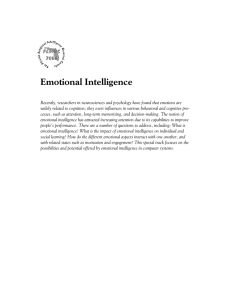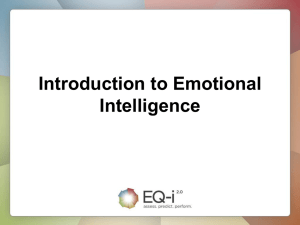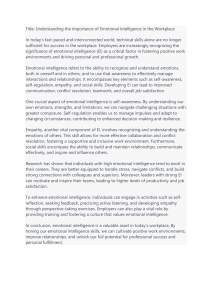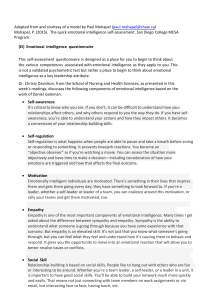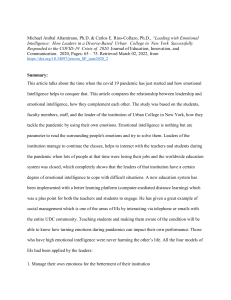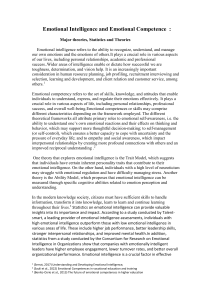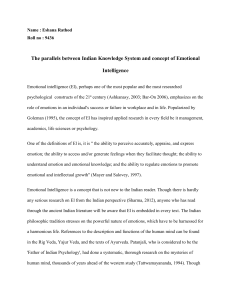What is Emotional Intelligence (EQ)?
advertisement
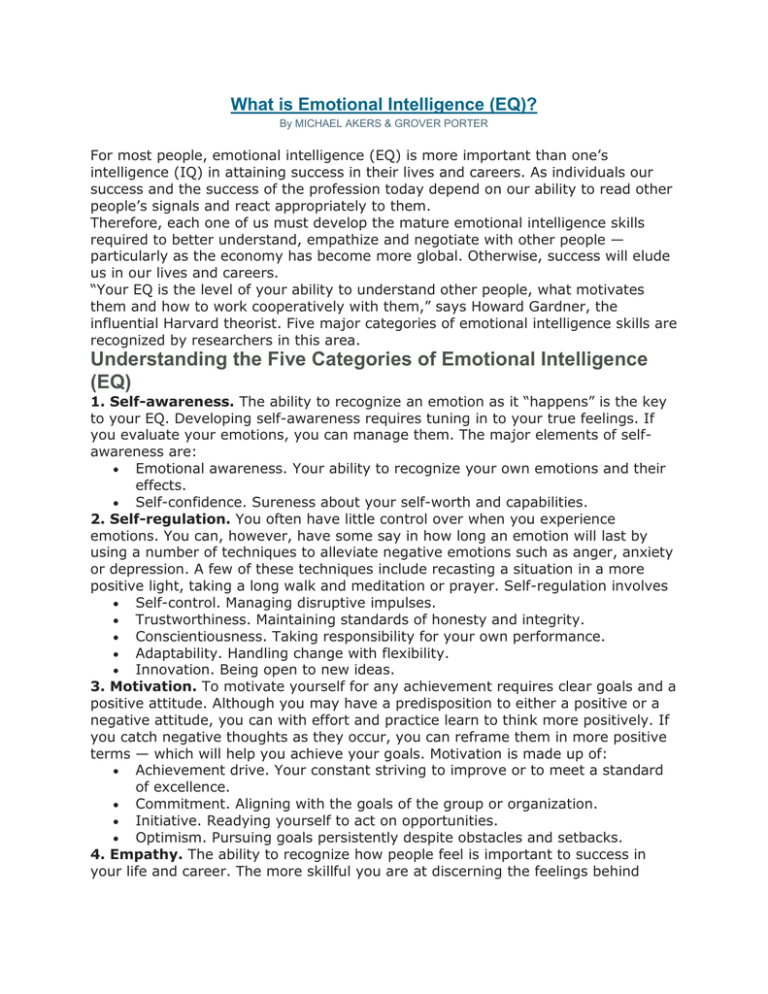
What is Emotional Intelligence (EQ)? By MICHAEL AKERS & GROVER PORTER For most people, emotional intelligence (EQ) is more important than one’s intelligence (IQ) in attaining success in their lives and careers. As individuals our success and the success of the profession today depend on our ability to read other people’s signals and react appropriately to them. Therefore, each one of us must develop the mature emotional intelligence skills required to better understand, empathize and negotiate with other people — particularly as the economy has become more global. Otherwise, success will elude us in our lives and careers. “Your EQ is the level of your ability to understand other people, what motivates them and how to work cooperatively with them,” says Howard Gardner, the influential Harvard theorist. Five major categories of emotional intelligence skills are recognized by researchers in this area. Understanding the Five Categories of Emotional Intelligence (EQ) 1. Self-awareness. The ability to recognize an emotion as it “happens” is the key to your EQ. Developing self-awareness requires tuning in to your true feelings. If you evaluate your emotions, you can manage them. The major elements of selfawareness are: Emotional awareness. Your ability to recognize your own emotions and their effects. Self-confidence. Sureness about your self-worth and capabilities. 2. Self-regulation. You often have little control over when you experience emotions. You can, however, have some say in how long an emotion will last by using a number of techniques to alleviate negative emotions such as anger, anxiety or depression. A few of these techniques include recasting a situation in a more positive light, taking a long walk and meditation or prayer. Self-regulation involves Self-control. Managing disruptive impulses. Trustworthiness. Maintaining standards of honesty and integrity. Conscientiousness. Taking responsibility for your own performance. Adaptability. Handling change with flexibility. Innovation. Being open to new ideas. 3. Motivation. To motivate yourself for any achievement requires clear goals and a positive attitude. Although you may have a predisposition to either a positive or a negative attitude, you can with effort and practice learn to think more positively. If you catch negative thoughts as they occur, you can reframe them in more positive terms — which will help you achieve your goals. Motivation is made up of: Achievement drive. Your constant striving to improve or to meet a standard of excellence. Commitment. Aligning with the goals of the group or organization. Initiative. Readying yourself to act on opportunities. Optimism. Pursuing goals persistently despite obstacles and setbacks. 4. Empathy. The ability to recognize how people feel is important to success in your life and career. The more skillful you are at discerning the feelings behind others’ signals the better you can control the signals you send them. An empathetic person excels at: Service orientation. Anticipating, recognizing and meeting clients’ needs. Developing others. Sensing what others need to progress and bolstering their abilities. Leveraging diversity. Cultivating opportunities through diverse people. Political awareness. Reading a group’s emotional currents and power relationships. Understanding others. Discerning the feelings behind the needs and wants of others. 5. Social skills. The development of good interpersonal skills is tantamount to success in your life and career. In today’s always-connected world, everyone has immediate access to technical knowledge. Thus, “people skills” are even more important now because you must possess a high EQ to better understand, empathize and negotiate with others in a global economy. Among the most useful skills are: Influence. Wielding effective persuasion tactics. Communication. Sending clear messages. Leadership. Inspiring and guiding groups and people. Change catalyst. Initiating or managing change. Conflict management. Understanding, negotiating and resolving disagreements. Building bonds. Nurturing instrumental relationships. Collaboration and cooperation. Working with others toward shared goals. Team capabilities. Creating group synergy in pursuing collective goals. What factors are at play when people of high IQ fail and those of modest IQ succeed? How well you do in your life and career is determined by both. IQ alone is not enough; EQ also matters. In fact, psychologists generally agree that among the ingredients for success, IQ counts for roughly 10% (at best 25%); the rest depends on everything else — including EQ. A study of Harvard graduates in business, law, medicine and teaching showed a negative or zero correlation between an IQ indicator (entrance exam scores) and subsequent career success. Three examples illustrate the importance of emotional competencies.

